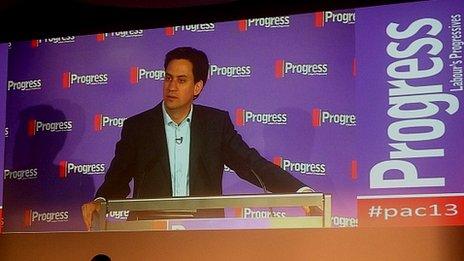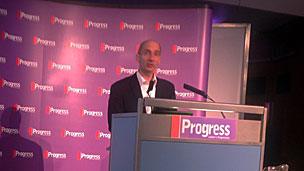Ed Miliband must get 'match fit', says New Labour group
- Published

Some people travel half way round the world to seek the wisdom of lost tribes.
All Ed Miliband had to do was turn left off Tottenham Court Road.
The Labour leader's pilgrimage to the Progress conference, in the unlikely surroundings of the TUC headquarters in Central London, has become an annual event.
Some of his friends in the trade union movement will not be happy with this. They would like to see the self-styled New Labour think tank hunted into extinction, its members expelled from the Labour family.
Even some of the group's own supporters are unsure of where it stands in an era when New Labour is meant to be dead.
Mr Miliband had to reassure one anxious activist that it was still OK for Progress to call itself a New Labour think tank. Labour had to be a broad church, he told her.
'Match fit'
But whether the left likes it or not, Progress remains a force within the party, containing some of its sharpest minds and, on the evidence of Saturday's event, sharpest tongues as well.
Progress used Saturday's conference to launch its campaign for a Labour majority.
But first, You Gov polling guru Peter Kellner explained how much of a mountain they had to climb.

Former Transport Secretary Lord Adonis was among the speakers
He compared Labour to a walker he met in the Himalayas who had turned up without doing any training.
Labour "has got to get match fit, it has got to prepare", he said.
He has produced research which suggests voters think Labour is "nice" but Ed Miliband is incapable of taking tough decisions.
Only one opposition party in 80 years has managed to win back power after one term, he argues, and on current form Mr Miliband is pretty unlikely to buck that trend.
The main problem for Mr Miliband is that there seems to be very few "Tory switchers" out there.
It is not like 1995, when Conservatives voters were coming over to Tony Blair's Labour in their thousands, particularly in the South of England.
Andrew Harrop, of the Fabian Society, suggested Mr Miliband's best hope was to cobble together some kind of majority from disaffected former Lib Dems, people who had never voted before and the tiny band of Tory switchers.
'Weakest' policy
Harriet Harman dismissed such talk as "defeatism". No one could accuse the Labour activists who won hundreds of council seats in the local elections, in Tory heartlands, of complacency, she said.
Mr Miliband, in his keynote speech, said he was aware of the scale of his challenge and the desperate need to frame a message that will enthuse voters disenchanted with the entire political class.
But there was a sense of restlessness among activists. With two years to go to an election they are still waiting for the outcome of Mr Miliband's policy review.
They badly want a tune to whistle on the doorstep, a big idea that Labour can call its own.
Plans to set up regional investment banks are hardly likely to set voters' pulses racing, pointed out Tony Blair's former speech writer Philip Collins, now chief leader writer at The Times.
Ms Harman's protestations that the party already had big ideas, such as the compulsory jobs guarantee for the young unemployed, seemed to cut little ice.
This was the "weakest" policy Labour has ever had, one Progress member told Ms Harman from the floor.
Then there was Lord Mandelson.
Victory
The former business secretary, who backed David Miliband for the Labour leadership, did little to hide his disdain for the direction in which Ed is taking the party.
He railed at what he claimed was the "disgraceful" influence of the trade unions on candidate selection.
He poured scorn on Mr Miliband's vision of a One Nation Labour party and country, saying it was not a sufficiently robust platform on which to win an election.
He wants Mr Miliband to reach out to potential Tory-switchers by showing how tough he would be on public spending and the deficit.
But it would be wrong to characterise Saturday's conference as a counsel of despair. Activists know victory is possible and they seem more than ready for the fight.
Mr Miliband was greeted with real warmth and some members spoke at fringe events of the electrifying effect his One Nation speech at last year's Labour conference had had on them.
But others complained he had yet to follow up on that speech, beyond attaching the words "One Nation" to every press release, as one activist from Gateshead put it.
And others still just can't seem to get over the fact that Ed - and not David - is leading them into the next election.
At the very end of the conference, Times columnist David Aaranovitch asked the audience how many of them thought Labour could win a majority with Ed Miliband as leader.
There was something uncomfortably close to silence.
- Published11 May 2013
- Published11 May 2013